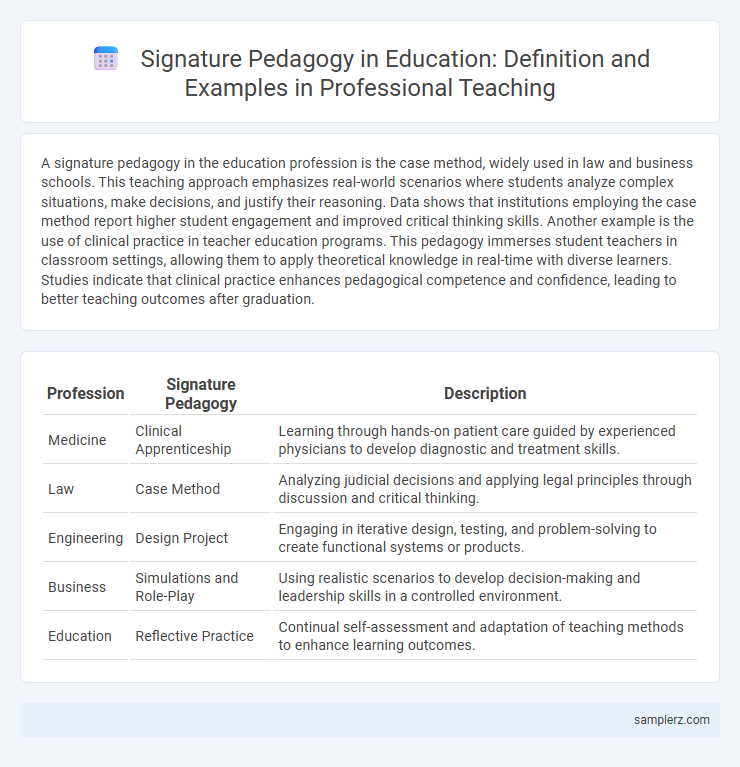A signature pedagogy in the education profession is the case method, widely used in law and business schools. This teaching approach emphasizes real-world scenarios where students analyze complex situations, make decisions, and justify their reasoning. Data shows that institutions employing the case method report higher student engagement and improved critical thinking skills. Another example is the use of clinical practice in teacher education programs. This pedagogy immerses student teachers in classroom settings, allowing them to apply theoretical knowledge in real-time with diverse learners. Studies indicate that clinical practice enhances pedagogical competence and confidence, leading to better teaching outcomes after graduation.
Table of Comparison
| Profession | Signature Pedagogy | Description |
|---|---|---|
| Medicine | Clinical Apprenticeship | Learning through hands-on patient care guided by experienced physicians to develop diagnostic and treatment skills. |
| Law | Case Method | Analyzing judicial decisions and applying legal principles through discussion and critical thinking. |
| Engineering | Design Project | Engaging in iterative design, testing, and problem-solving to create functional systems or products. |
| Business | Simulations and Role-Play | Using realistic scenarios to develop decision-making and leadership skills in a controlled environment. |
| Education | Reflective Practice | Continual self-assessment and adaptation of teaching methods to enhance learning outcomes. |
Understanding Signature Pedagogies in Professional Education
Signature pedagogies in professional education, such as the Socratic method in law schools or clinical simulations in medical training, are designed to cultivate critical thinking and practical skills essential for professional competence. These instructional approaches emphasize active learning and reflective practice, enabling students to internalize the norms, values, and decision-making processes characteristic of their respective professions. Understanding these pedagogies reveals how education shapes professional identity and prepares learners for real-world challenges in their careers.
The Role of Signature Pedagogy in Shaping Professional Identity
Signature pedagogy in education, such as the use of case-based learning in medical training, plays a pivotal role in shaping professional identity by integrating theoretical knowledge with practical decision-making skills. This method fosters critical thinking and ethical reasoning, enabling students to internalize the values and responsibilities of their profession. By engaging learners in authentic scenarios, signature pedagogy solidifies their sense of belonging and commitment to the standards of their chosen field.
Clinical Rounds: Signature Pedagogy in Medical Education
Clinical rounds serve as a signature pedagogy in medical education by integrating direct patient care with real-time decision-making and clinical reasoning. This immersive teaching method allows medical students to observe experienced physicians, engage in diagnostic discussions, and apply theoretical knowledge to practical scenarios. The hands-on experience during rounds cultivates professional competence, critical thinking, and collaborative skills essential for clinical practice.
Case Briefing: Hallmark of Legal Education
Case briefing exemplifies a signature pedagogy in legal education, enabling students to distill complex judicial opinions into concise summaries that highlight facts, issues, rulings, and reasoning. This method cultivates critical thinking and analytical skills essential for practicing law, fostering a deep understanding of legal principles and precedents. Mastery of case briefing prepares law students for real-world legal problem-solving and effective communication within the profession.
Design Studios: Core Practice in Architecture Education
Design studios represent the signature pedagogy in architecture education, emphasizing hands-on, project-based learning where students engage in iterative design processes. This core practice fosters critical thinking, creativity, and collaboration by integrating real-world problems with theoretical knowledge. Faculty mentorship and peer critiques further enhance skill development, preparing students for professional architectural practice.
Reflective Practice in Teacher Education
Reflective practice in teacher education exemplifies a signature pedagogy by fostering critical self-assessment and continuous professional growth among educators. This method encourages pre-service teachers to analyze their instructional strategies, classroom interactions, and student outcomes to improve teaching effectiveness. By embedding reflection into curriculum and field experiences, teacher education programs enhance adaptive expertise and promote lifelong learning skills essential for educational success.
Apprenticeship Model in Engineering Pedagogy
The Apprenticeship Model in engineering pedagogy immerses students in hands-on, real-world problem-solving under the guidance of experienced engineers, fostering deep technical skills and professional judgment. This signature pedagogy emphasizes collaborative project-based learning, reflective practice, and iterative feedback, aligning academic knowledge with workplace demands. It cultivates competencies such as critical thinking, design innovation, and effective communication within authentic engineering contexts.
Performance Critique in Arts and Music Training
Performance critique in arts and music training exemplifies signature pedagogy by engaging students in rigorous analysis and reflective evaluation of live or recorded performances. This method cultivates critical listening skills, interpretive insight, and constructive feedback abilities essential for professional artistic growth. Emphasizing peer and instructor feedback, performance critique fosters iterative improvement and deepens understanding of artistic standards and expression.
Simulation-Based Learning in Nursing Programs
Simulation-based learning in nursing programs enhances clinical judgment and hands-on skills through realistic patient care scenarios. High-fidelity mannequins and virtual simulations provide experiential learning environments, promoting critical thinking and decision-making under pressure. This signature pedagogy bridges theoretical knowledge and practical application, preparing students for real-world nursing challenges effectively.
Project-Based Learning in Business and Management Education
Project-Based Learning (PBL) serves as a signature pedagogy in Business and Management Education by immersing students in real-world challenges that develop critical thinking, collaboration, and problem-solving skills. This hands-on approach enables learners to apply theoretical concepts to actual business scenarios, enhancing retention and practical expertise. Organizations such as the Princeton Review emphasize PBL's impact on preparing students for dynamic market environments and leadership roles.

example of signature pedagogy in profession Infographic
 samplerz.com
samplerz.com